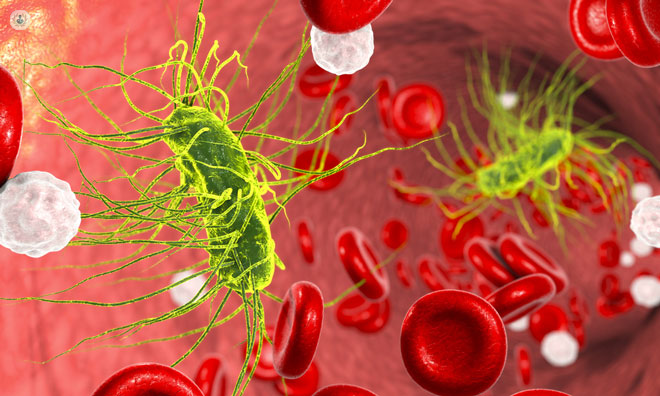


What is sepsis?
Sepsis is a serious disease that occurs when the body has an exaggerated response to a bacterial infection. The substances released into the blood to fight the infection cause widespread inflammation, resulting in the creation of blood clots and blood vessel leakage. This causes poor blood flow, depriving the organs of nutrients and oxygen. In the most severe cases one or more organs may fail, and in the worst cases the blood pressure drops and the heart weakens, causing septic shock.
Prognosis of sepsis
Sepsis is a condition with a high mortality rate. It occurs when the body responds to an infection but damages its own tissues and organs. The prognosis depends on how long it takes to start treatment. If the condition is diagnosed at an early stage, it can be treated with antibiotics. However, if the diagnosis is incorrect and no treatment is given, it can be fatal, since it can quickly develop into severe sepsis or septic shock.
Symptoms of sepsis
The most frequent symptoms of sepsis are fever, increased heart rate and respiratory rate, chills, rashes, confusion and feeling disoriented. Most of these symptoms are also present in other conditions, which is why sepsis is a difficult disease to diagnose, especially in the early stages.
In severe sepsis, one or more organs may start failing, which can lead to symptoms such as abdominal pain, difficulty breathing, or decreased urination.
Medical tests for sepsis
Diagnosing sepsis is complicated because its symptoms can be confused with those of other conditions. Doctors use different tests and medical examinations for a more precise diagnosis.
Blood tests: the aim of these is to look for:
- Signs of infection
- Clotting problems
- Abnormal liver or kidney function
- Decreased availability of oxygen
- Electrolyte imbalances
Other laboratory tests: depending on the symptoms of each person, the specialist may test:
- The patient’s urine
- Secretions from the wound (if the patient has a visible injury)
- Respiratory secretions
Diagnostic imaging: if the specialist is unable to identify the site of infection, they may perform one of the following image-based tests.
- Radiography
- CT
- Ultrasound
- MRI
What are the causes of sepsis?
Any type of infection, whether bacterial, viral or fungal, can lead to sepsis. However, sepsis is most commonly caused by the following:
- Pneumonia
- Abdominal infection
- Kidney infection
- Infection of the bloodstream (bacteraemia)
Risk factors include old age and a weakened immune system. The rise of drug-resistant bacteria also poses a risk of sepsis.
Can sepsis be prevented?
The main recommendations are to keep the immune system healthy and to have infections treated early, as the risk of sepsis is higher if the immune system is weakened or if there is an infection caused by a variety of pathogens or by very serious pathogens.
Treatments for sepsis
Aggressive treatment of the infection increases the chances of surviving septicaemia. Most patients with sepsis will be admitted to the hospital. Patients with severe septicaemia or septic shock will be taken to the ICU (intensive care unit), and measures must be taken to stabilise breathing and heart function. The following treatments may be used:
- Antibiotics
- Fluids delivered intravenously to prevent dehydration
- The patient may be given oxygen
- Vasopressors to counter low blood pressure
- Emergency treatments, such as a blood transfusion or mechanical ventilation may be needed in severe cases.
Which specialist treats it?
Intensive care medicine specialists deal with cases of sepsis.
